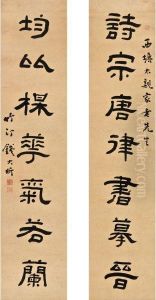Qian Daxin Paintings
Qian Daxin was a prominent Chinese scholar, historian, and epigrapher of the Qing Dynasty, born in 1728 in Jiading, which is now part of Shanghai. His life spanned a period of significant transition in China, witnessing the zenith and the beginning of the decline of the Qing Dynasty. Qian was born into a family with a rich scholarly tradition, which set the foundation for his extensive education in classical Chinese literature, history, and philology. His intellectual prowess and dedication to scholarship earned him a distinguished place among the literati of his time.
Qian Daxin's contributions to Chinese scholarship were vast and varied. He is especially renowned for his work in the field of historical criticism and textual research. One of his most significant contributions was his critical approach to historical texts, where he applied rigorous methods of textual criticism and verification, setting new standards for historical scholarship in China. His work, 'Researches on Antiquities' (Gu Jin Tu Shu Ji Cheng), exemplifies his meticulous approach to historiography and his commitment to accuracy and depth in scholarly research.
Throughout his career, Qian Daxin also made significant contributions to the study of epigraphy, numismatics, and philology, demonstrating a broad interest in various fields of study. He was a pioneer in the use of epigraphic sources for historical research, contributing to a deeper understanding of China's past. Furthermore, his efforts in the compilation and critical study of historical texts were instrumental in preserving and elucidating China's rich literary tradition.
Despite his scholarly achievements, Qian Daxin's life was not without challenges. He lived through a period marked by internal strife and external threats to the Qing Dynasty, which influenced his outlook and scholarly work. Nevertheless, his dedication to scholarship and his intellectual legacy have left an indelible mark on Chinese historiography and scholarship, earning him a revered place among China's great scholars. Qian Daxin died in 1804, but his work continues to influence scholars and historians, reflecting his enduring impact on the study of Chinese history and culture.
